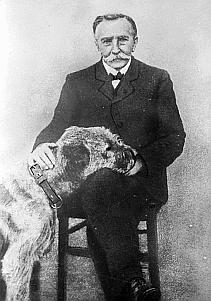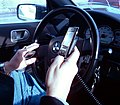Portal:Telephones

A telephone, colloquially referred to as a phone, is a telecommunications device that permits two or more users to conduct a conversation when they are too far apart to be easily heard directly. A telephone converts sound, typically and most efficiently the human voice, into electronic signals that are transmitted via cables and other communication channels to another telephone which reproduces the sound to the receiving user. The term is derived from Ancient Greek: τῆλε, romanized: tēle, lit. 'far' and φωνή (phōnē, voice), together meaning distant voice.
In 1876, Alexander Graham Bell was the first to be granted a United States patent for a device that produced clearly intelligible replication of the human voice at a second device. This instrument was further developed by many others, and became rapidly indispensable in business, government, and in households. (Full article...)

A mobile phone or cell phone is a portable telephone that can make and receive calls over a radio frequency link while the user is moving within a telephone service area, as opposed to a fixed-location phone (landline phone). The radio frequency link establishes a connection to the switching systems of a mobile phone operator, which provides access to the public switched telephone network (PSTN). Modern mobile telephone services use a cellular network architecture, and therefore mobile telephones are called cellphones (or "cell phones") in North America. In addition to telephony, digital mobile phones support a variety of other services, such as text messaging, multimedia messaging, email, Internet access (via LTE, 5G NR or Wi-Fi), short-range wireless communications (infrared, Bluetooth), satellite access (navigation, messaging connectivity), business applications, payments (via NFC), multimedia playback and streaming (radio, television), digital photography, and video games. Mobile phones offering only basic capabilities are known as feature phones (slang: "dumbphones"); mobile phones that offer greatly advanced computing capabilities are referred to as smartphones. (Full article...)
A smartphone, often simply called a phone, is a mobile device that combines the functionality of a traditional mobile phone with advanced computing capabilities. It typically has a touchscreen interface, allowing users to access a wide range of applications and services, such as web browsing, email, and social media, as well as multimedia playback and streaming. Smartphones have built-in cameras, GPS navigation, and support for various communication methods, including voice calls, text messaging, and internet-based messaging apps. (Full article...)
Selected article -
Direct distance dialing (DDD) is a telecommunications service feature in North America by which a caller may, without operator assistance, call any other user outside the local calling area. Direct dialing by subscribers typically requires extra digits to be dialed as prefixes to the directory telephone number of the destination. International Direct Distance Dialing (IDDD) extends the system beyond the geographic boundaries of the North American Numbering Plan (NANP). (Full article...)
Types of phones -

An emergency telephone is a public telephone provided for making calls to emergency services. (Full article...)
Selected audio -
In telephony, a special information tone (SIT) is an in-band international standard call progress tone consisting of three rising tones indicating a call has failed. It usually precedes a recorded announcement describing the problem. (Full article...)
List articles

- Comparison of smartphones
- List of best-selling mobile phones
- List of countries by number of broadband Internet subscriptions
- List of countries by number of telephone lines in use
- List of countries by smartphone penetration
- List of country calling codes
- List of iPhone models
- List of mobile network operators
- List of mobile phone brands by country
- List of mobile phone generations
- List of telecommunications companies
Related portals
General images -
Selected biography

Charles Bourseul (28 April 1829 – 23 November 1912) was a pioneer in development of the "make and break" telephone about 20 years before Bell made a practical telephone.
Bourseul was born in Brussels, Belgium, and grew up in Douai, France. His father was a French army officer. Charles worked for the telegraph company as a civil engineer and mechanic. He made improvements to the telegraph system of L. F. Breguet (a French instrument maker) and Samuel F. B. Morse. Charles Bourseul experimented with the electrical transmission of the human voice and developed an electromagnetic microphone, but his telephone receiver was unable to convert electric current back into clear human voice sounds.
In 1854 Bourseul wrote a memorandum on the transmission of the human voice by electric currents that was first published in a magazine L'Illustration (Paris), though no prototype was built. That is about the same time that Meucci later claimed to have created his first attempt at the telephone in the United States of America. (Full article...)
Selected images
Topics
Subcategories

More
 |
Here are some tasks awaiting attention:
|
Telephones in the news
- 15 November 2024 – Russian invasion of Ukraine, Germany–Russia relations
- German Chancellor Olaf Scholz holds a telephone call with Russian President Vladimir Putin about the war in Ukraine, their first contact since 2022. Putin tells Scholz that any negotiated settlement to end the war must recognize the territories that Russia has occupied as part of Russia and that Ukraine must abandon its aspiration to join NATO. (AP) (The New York Times)
- 29 October 2024 –
- Four people are injured after a derailed tram crashes into a phone and computer shop in central Oslo, Norway. (Euronews)
Associated Wikimedia
The following Wikimedia Foundation sister projects provide more on this subject:
-
Commons
Free media repository -
Wikibooks
Free textbooks and manuals -
Wikidata
Free knowledge base -
Wikinews
Free-content news -
Wikiquote
Collection of quotations -
Wikisource
Free-content library -
Wikiversity
Free learning tools -
Wiktionary
Dictionary and thesaurus














































































































